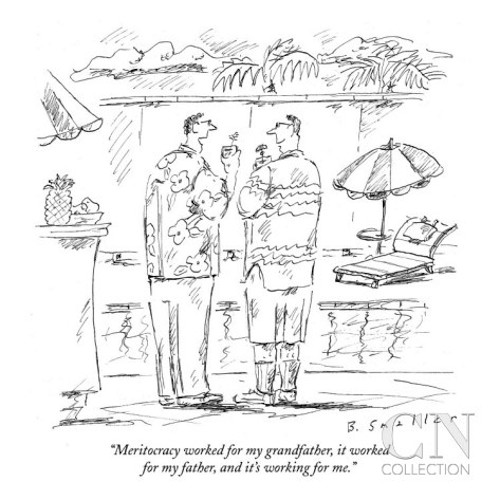It’s almost noon in the one true time zone, so it’s basically the weekend. And not just any weekend—it’s the weekend of Memorial Day, a holiday of pure enjoyment uncomplicated by any depressing overtones. It must be party time, because my neighbors have put a smoker in our shared yard, right next to their grill, their fire pit, their canopy tent, their second grill, their chairs, their woodpile and their broken-pieces-of-palettes pile, amid the general distribution of their beer cans. Today is Friday, and I can’t escape my home office quickly enough. Won’t you bang something out and knock off with me?
Tag Archives: salon
Deresiewicz on “hereditary meritocracy”
Halfway through this interview with Salon, critic of the Ivy League (and Ivy-League critic) Michael Deresiewicz discusses the way that our ostensibly meritocratic college admissions system serves to “launder privilege”:
Instead of saying, “You get to go because you’re born,” which is obviously unfair, we say, “You get to go because you have really great scores and grades and you’ve done a million extracurricular activities.” But the only way to get to that point is if you have rich parents. I mean, again, there are exceptions, but there are not a lot of exceptions.
Approximately 35,000 kids apply to Harvard each year, and 2,000 get in. When I was an SAT tutor, more kids submitted perfect scores to Yale than there were total admissions slots. As selective colleges become more selective, admissions become an arms race of adolescent achievement—one that demands more money than lower- and even middle-income families can afford. But we are invested in believing this system rewards merit, because the Ivies and so-called junior Ivies produce so many of our leaders.
What does Cornel West mean when he says “brother?”
The Cure sent me a link to this interview between Cornel West and Thomas Frank, in which they agree that everyone is extremely disappointed with President Obama’s failure to be more progressive. They seem to mean everyone they know, which may be a closed epistemic circle. But I’m less interested in West’s assessment of what everyone thinks than his use of the word “brother.” For example:
[Obama] invoked the American family last week. It’s a lie, brother. You’ve got to be able to tell the truth to the American people. We’re not a family. We’re a people. We’re a nation. And a nation always has divisions.
So if West does not use “brother” to invoke the idea of a human or American family—if he in fact uses it when explicitly refuting that concept—what does he mean? Close reading after the jump.
Ethical dilemma of the day: hipsters on food stamps

At this point, the iconography of hipsterism has become so esoteric as to just be iconography itself. If your primary focus is your clothes and you still look terrible, you're a hipster. Photo courtesy of latfh.com.
Salon provides us with an interesting ethical question/reminds us of its existence today, with this article about hip, educated young people who use food stamps to buy organic groceries. Much to the consternation of Mose, hipsters have been a perennial object of fascination here at Combat! blog, in part because they’re so difficult to pin down. In reporting the apparent uptick in hipster consumption of Supplemental Nutrition Assistance Program benefit cards, Jennifer Bleyer acknowledges the difficulty of proving that what she’s writing about is actually happening. “The increase in food stamp use among this demographic is hard to measure,” she admits, “as they represent a cross section of characteristics not specifically tracked by the Agriculture Department, which administers the program.” When writing about hipsters, one must continually examine the possibility that they do not exist. For Bleyer’s purposes, the hipster is a fairly identifiable, if vague, marketing demographic: twenty/thirtysomething, college-educated, and willing to pay money for organic tarragon. In this case, the money is yours.
Conservative is the new counterculture
| The Daily Show With Jon Stewart | Mon – Thurs 11p / 10c | |||
| Rage Within the Machine – Progressivism | ||||
|
||||
There’s Glenn Beck, explaining that progressivism is just revolutionary socialism, only with gradual change instead of sudden upheaval, effort within the existing system instead of violence, and consensus-building instead of dictatorial fiat. So it’s like, um, American democracy. Still, when you really think*  about it, progressivism is just radical communism by another name, the same way your uncle is just your aunt with testicles. We can forgive Glenn Beck for confusing an established political idea with its complement, or for decrying the abuses of progressivism even as he praises his local library, since he is speaking at the Conservative Political Action Conference, where up is down, black is white, white is also white, and conservatism—that age-old defender of institutions and tradition—has finally become the counterculture.
about it, progressivism is just radical communism by another name, the same way your uncle is just your aunt with testicles. We can forgive Glenn Beck for confusing an established political idea with its complement, or for decrying the abuses of progressivism even as he praises his local library, since he is speaking at the Conservative Political Action Conference, where up is down, black is white, white is also white, and conservatism—that age-old defender of institutions and tradition—has finally become the counterculture.



